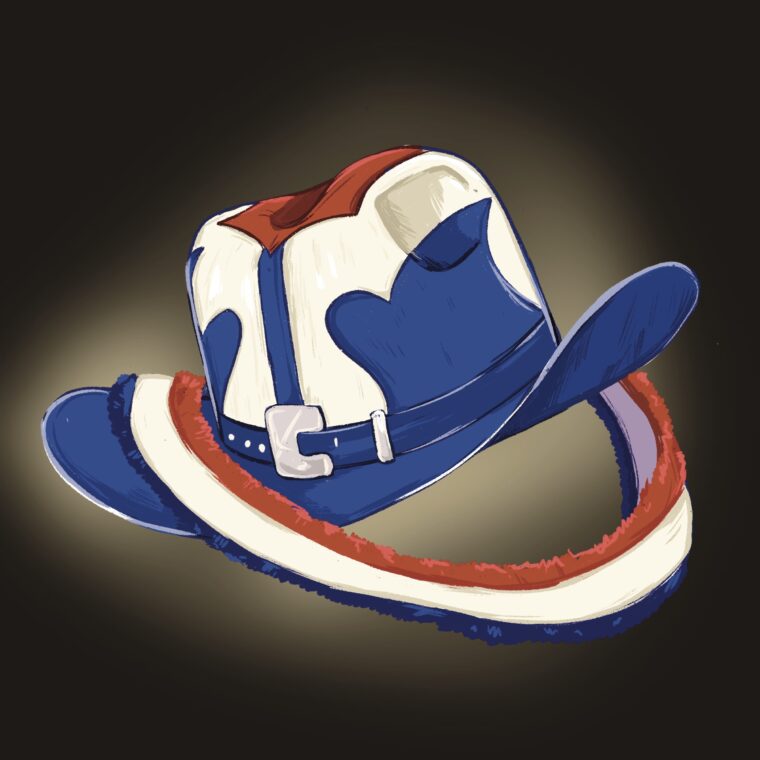Music | Scene
Beyoncé’s “Cowboy Carter”: Yee-haw or Yee-naw?

(Jaime Hebel | Student Life)
On March 29, Beyoncé released her ninth studio album, “Cowboy Carter,” the second act of her ninth studio album, “Renaissance.” The album’s aesthetics promised a full-blown country album, with cowboy hats, horses, and American flags galore. Beyoncé’s Texas roots were also suspected to come to fruition within this album. And yet, on Instagram, ten days prior to the album’s release, the singer wrote, “This ain’t a Country album. This is a ‘Beyoncé’ album.” And that it is. The album is artfully genre-bending, weaving between country, R&B, rap, gospel, and pop.
Historically, country music is a genre with little diversity. According to the study “Redlining in Country Music” by Dr. Jada Watson, an investigator for SongData, of the 411 artists who signed to the top three Nashville labels from 2000–2020, 1% were Black and 3.2% were Black, Indigenous, or People of Color. The genre of country music is also one that has previously been unwelcome to Beyoncé. At the 50th annual Country Music Awards in 2016, the singer performed her song “Daddy Issues” with the Chicks. In the aftermath, many country fans were horrified and declared that Beyoncé had no place in the genre, much less at a ceremony celebrating country’s biggest achievements of the year, due to her outspoken support for Black Lives Matter. But now, Beyoncé proudly and deliberately reclaims her place in the genre that has been unwelcoming to her and her peers, demanding a voice: “It’s a lot of talkin’ goin’ on/While I sing my song/Can you hear me?/I said, ‘Do you hear me?’” she cries in the opening track, “AMERICAN REQUIEM.”
Throughout the album, Beyoncé weaves in powerful moments of reflection of what it means to be a Black woman in country music and in America as a whole. “Blackbird,” a Beatles song that Beyoncé covers on the album, was originally written by Paul McCartney about the struggles of Black girls and women during the American Civil Rights Movement. With back-up vocals by Black country artists Tanner Adell, Brittney Spencer, Tiera Kennedy, and Reyna Roberts, Beyoncé’s heartbreakingly beautiful cover further pushes the message that it is the time for Black women to rise into spaces where they are and have not been welcome in due to racist attitudes. “All your life/You were only waiting for this moment to be free,” she croons.
Other lyrics also reference the struggles of Black Americans. In “YA YA,” Beyoncé declares, “Whole lotta red in that white and blue, huh/History can’t be erased, ooh,” pointing to the historical violence against Black individuals within the United States. In the same song and during the album rollout, Beyoncé refers to the Chitlin’ Circuit, a network of spaces where Black artists could safely perform during the Jim Crow era.
The album also features more light-hearted and effervescent love songs. “LEVII’S JEANS” is sensual, flirty, and smooth. Beyoncé sings, “You call me pretty little thing/And I love to turn him on,/Boy, I’ll let you be my Levi’s jeans.” The track is a collaboration with Post Malone, whose slightly breathy and gritty vocals complement Beyoncé’s perfectly. “DESERT EAGLE” is a funk-focused track with a riveting Thundercat-esque baseline that shines. The lyrics, however, are rather simple. Beyoncé repeats the words “do-si-do” at the beginning and end of the song to evoke the imagery of a line dance. It’s a pretty typical Beyoncé love song as she sings, “Soft to the touch, let you hold somethin’/Let you get a handful/Baby, she’s a whole lotta woman.” Another track,“II MOST WANTED,” is a stunning collaboration between Miley Cyrus and Beyoncé. The track’s satisfying melody creates a campfire-like feeling, as the two sing, “I’ll be your shotgun rider/’Til the day I die/Smoke out the window flyin’/Down the 405.”
Perhaps the best of Beyoncé’s love songs on this album is “ALLIIGATOR TEARS.” Backed by a twangy guitar melody, Beyoncé reveals a deep and immutable love of her subject. She declares, “You say stop the river from runnin’/I’ll build a dam or two/You say change religions/Now, I spend Sundays with you/Somethin’ ’bout those tears of yours/How does it feel to be adored?”
Other than love songs and reflections on Blackness in America, “Cowboy Carter” features a rather eclectic mix of themes and subjects. In “PROTECTOR,” Beyoncé gorgeously reminisces about motherhood on top of a sparse and light guitar melody, singing, “Even though I know, someday, you’re gonna shine on your own/I will be your projector.” “SPAGHETTII” is Beyoncé’s declaration that she is the master of mixing genres. “Genres are a funny little concept, aren’t they…In theory, they have a simple definition that’s easy to understand/But in practice, well, some may feel confined,” Linda Martell, the first commercially successful Black female country artist, contends in the song’s intro. Beyoncé proves just this as she raps over an electric beat in the upbeat and powerful track.
The star of the album, however, is “YA YA.” The track flawlessly samples Nancy Sinatra’s “These Boots Are Made for Walking” and interpolates the Beach Boys’ “Good Vibrations,” all while Beyoncé’s vocals soar. The production only adds to the perfection that is this song. With a marching drumbeat coupled with a roaring electric guitar line, the song is an absolute hit. “I got you daydreamin’/Put your lips on my lips/And strum me like a guitar,” Beyoncé growls.
Beyoncé’s 80-minute long “Cowboy Carter,” is a powerhouse of an album that proudly asserts Beyoncé’s place as a master genre-bender. She delivers hit after hit, all while proving the critics who believed that she did not deserve a place in the genre of country wrong. This is, after all, a Beyoncé album. What else did you expect?
